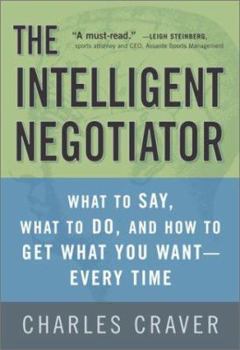The Intelligent Negotiator: What to Say, What to Do, How to Get What You Want--Every Time
A practical guide to the negotiating process covers different bargaining styles, avoiding psychological pitfalls, and closing a deal, providing exercises and anecdotes on how to build a personal style.
Format:Hardcover
Language:English
ISBN:0761537252
ISBN13:9780761537250
Release Date:October 2002
Publisher:Prima Lifestyles
Length:281 Pages
Weight:1.00 lbs.
Dimensions:1.0" x 6.0" x 8.7"
Related Subjects
Business Business & Investing Economics Management & Leadership Negotiating Popular EconomicsCustomer Reviews
3 ratings
Valuable For International Negotiations, Too
Published by Thriftbooks.com User , 20 years ago
As a consultant in International and Cross-Cultural Management, I found this book particularly valuable. That's because it not only is a great and comprehensive compendium on effective negotiating (as others already pointed out), but it also covers techniques negotiators may be less likely to find used in the US but are likely to run into when abroad. Examples are extreme openings, time pressure, large negotiation teams, and so on. This makes the book very valuable in preparing for overseas negotiation, for instance in Asia.
Outstanding
Published by Thriftbooks.com User , 20 years ago
Charles Craver is the Leroy S. Merrifield Research Professor of Law at George Washington University (Washington, D.C.) where he teaches negotiating. Through his work at the Law School and in workshops throughout the world, Professor Craver estimates that he has taught negotiating skills to some 60,000 attorneys and businesspersons. The Intelligent Negotiator is a book that fulfills the promise of its title. Craver provides the reader with the techniques and skills to become a true master of the craft. Unquestionably, The Intelligent Negotiator will prove invaluable for the beginning negotiator and a solid source for refining the skills of the more experienced practitioner. Refreshingly, in a field in which so much has been written and is often unacknowledged, Craver credits and draws upon the research and findings of its authors. Additionally, although he has a preferred approach to negotiations, the author provides a fundamental negotiating skills book that does not rest upon the adoption of a singular negotiating style. "Don't even try to adopt just one negotiating style or philosophy," Craver tells his reader in the first sentence of his work, "for there is no single approach that can effectively govern all bargaining transactions" (p.3). The intelligent negotiator, in Professor Craver's view, is a person who is comfortable working within a suite of negotiating styles. The reader who understands that premise is on the way to wisdom. The experienced negotiator knows that no matter what the hopes, not every negotiation expands the pie. Negotiators come in all stripes and are driven by differing motives. Success in negotiations requires that its participants understand and adapt easily to the reality of functioning with an arena encompassing widely disparate styles. Craver notes three major approaches that the intelligent negotiator must master. The first of these is the Competitive-Adversarial. This is the stuff of win/lose negotiations, the zero sum game in which the pie is presumed to be fixed and one participant wins more if the other loses more. The second he defines as the Cooperative-Problem-Solving approach. In this style, the parties seek to expand the pie through engaging in a joint creative enterprise and thereby enable the participants to realize a win/win outcome. The intelligent negotiator recognizes that this second style has inherent rewards and significant risks of exploitation depending upon the true commitments of the parties at the bargaining table to the cooperative negotiating style. Both styles remain predominant in negotiating and Craver introduces the reader to some of the research on the effectiveness of practitioners of these two dominant negotiating styles. It is interesting research. Craver cites a study of the negotiating styles of practicing attorneys conducted by Professor Gerald Williams of Brigham Young University some twenty years ago that may surprise many readers. According to Professor Williams' research, mos
Excellent and well presented
Published by Thriftbooks.com User , 21 years ago
This book is excellent because it is well organized and maps out the negotiation process. Instead of just giving tips about various tactics, this book gives the reader a roadmap, which makes preparation for negotiation much easier. In my opinion, this book is second only to G. Richard Shell's, "Bargaining for Advantage."





